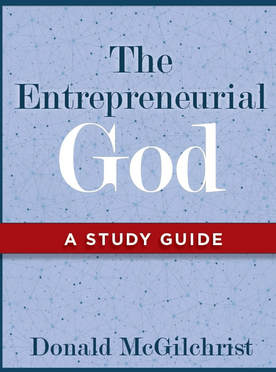 GEN Desk is excited to share the Global Commerce Network's release of its new book titled The Entrepreneurial God, written by Donald McGilchrist. The book can be purchased on Amazon. McGilchrist shows, through a study of the Scriptures, God as the grand innovator who, motivated by love, initiated the first "start-up" – our world. Despite this reality, the philosophical wedge driven between what our culture deems "sacred" and "secular" makes it difficult for business leaders to think about entrepreneurship and innovation through a theological lens. As a result, we miss out on the grandeur of how our enterprises fit within God's overarching purposes for the world. Our perspectives leave us with a narrow view of what it means to be entrepreneurs. The Entrepreneurial God helps us expand our vision and learn from the model of the grand innovator. We see that our enterprises can and should contribute to the shalom, or well-being, of our communities, our economies, and our workers. Donald McGilchirst, a founder of GCN, was born in London, England. He holds an MA from the University of Oxford. He worked for ten years in business in the UK before serving as an international vice president of The Navigators in the US. In this capacity, he focused on cross-cultural studies, communications, and international strategy. In addition to The Entrepreneurial God, he has authored several studies on the cultural and biblical significance of commerce and enterprise, with a focus on our daily work in the world, including The Meaning of Work (2015) and other books in GCN's six-book series titled Scriptural Roots of Commerce. Glenn McMahanGCN Initiatives
0 Comments
The Navigator’s calling is simple yet very profound, To advance the Gospel of Jesus and his Kingdom into the nations through spiritual generations of laborers living and discipling among the lost. The last part has an interesting word: “living”. To some this would mean “where you live”, yet I believe it has bigger implications. I believe this word means “your entire life” or “as you live”. If this is the case then we are to be making disciples where we live, where we play, and even where we work. Every part of life. I began my journey of discovering God in the workplace as I was graduating college. Perfect timing. The commands were quite clear in the Bible: to work heartily as unto the Lord and to do everything for the glory of God (Ephesians 6:5-8 and Colossians 3:22-24). The lost were all around me, so I had no problem believing Jesus when he said the harvest was plentiful. The longer I work (which I’ll admit has not been very long) the more God teaches me about following him in every aspect of my life, even work. When I went to the Entrepreneurial Readiness Workshop (ERW) I didn’t really know what to expect. I didn’t have a business idea ready or even have one brewing. Not a feasible one, anyway. Yet I know now that God used that workshop to teach me more about himself. And I don’t have to start a Missional Enterprise to put what I learned into practice! The triple bottom line is foundational to running a successful Missional Enterprise. Yet this same triple bottom line has the ability to inform everyone’s work from a corporate job to an entrepreneurship.
While I don’t know where God is leading me in regards to starting a Missional Enterprise or joining an existing one yet, I am already able to apply lessons from the ERW to my current workplace. How will you bring glory to God in every aspect of your life? GEN Desk Contributing Author and Nav 20s City Leader “One of the great challenges for everyone is finding a place in the world – seeing a lot, hearing a lot, reading a lot, and then deciding where we will be and what we will do. Knowing what we know, what will we do?” - Steven Garber, Visions of Vocation “Knowing what we know, what will you do?” Garber’s question parallels the parable of the Good Samaritan. When the man was left half dead between Jerusalem and Jericho, the priest, Levite, and Samaritan all saw the depleted man. Yet, the priest and Levite chose not to engage in the brokenness. Instead, they continued on their journeys. When the Samaritan saw the man, he knew the man was hurt and in desperate need of help. With this knowledge, he chose to help the man. He brought the man to the inn and took care of him. In Visions of Vocation, Steven Garber stresses the importance of engaging in the broken world around us, similar to how the Good Samaritan engaged with the hurt man. As Christians, he says “it is clear that the way we live shows what we believe.” Through missional enterprise, we have a chance to live in a way that will demonstrate what we believe. As we see problems around the world, we get to engage and create positive social impact, financial sustainability, and spiritual transformation through business. Jesus’ Kingdom advances. As Garber exemplifies in his book, whether you have the desire to start a clinic in an area with inadequate healthcare, an agriculture business that treats employees fairly and grows crops honestly, or a climbing gym to build trust in a society where it is lacking, you get to create positive change that brings glory to God. Just like the Good Samaritan, it is important to see the wounds of the world and to do something about it. Missional enterprise is one context that allows the Kingdom to salve the pain of the wounds. What are some specific ways your business could see the world as it is and step into the brokenness to make an impact? What are ways you could be the Good Samaritan to the hurting in your community or around the world? – GEN Desk Intern
Why does God’s presence in the workplace matter? The Great Commission challenges all of us, “Go and make disciples of all nations, baptizing them in the name of the Father and of the Son and of the Holy Spirit, and teaching them to obey everything I have commanded you” (Matthew 28:19-20, NIV). The average adult is awake 16 hours a day: one hour to prepare for work, 30 minutes each driving to and from work, eight hours at work. That’s already 10 out of 16 hours. Let’s contrast that with the time we invest at church. For some people, it’s just an hour a week. The point? The majority of our life is invested in preparation for work and in doing it. That’s why God’s presence in the workplace matters. God knew the struggle we were going to face in the workplace, so throughout Scripture He gave us clear instruction, warning and encouragement about our work. Instruction: “Whatever you do, work at it with all your heart, as working for the Lord, not for men, since you know that you will receive an inheritance from the Lord as a reward. It is the Lord Christ you are serving” (Colossians 3:23-24, NIV). Warning: “No one can serve two masters. Either he will hate the one and love the other, or he will be devoted to the one and despise the other. You cannot serve both God and Money” (Matthew 6:24, NIV). Encouragement: “Do not worry about your life, what you will eat or drink; or about your body, what you will wear. Is not life more important than food, and the body more important than clothes?” (Matthew 6:25, NIV). The workplace offers great opportunities to encourage those who know Christ and to witness to those who don’t. I have heard many arguments about why God does not belong in the workplace. There is the legal argument. The “it might offend someone” argument. The “what gives you the right?” argument. I have even heard the “it might scare off customers or employees” argument. But Jesus said, “I tell you, whoever acknowledges me before men, the Son of Man will also acknowledge him before the angels of God. But he who disowns me before men will be disowned before the angels of God.” (Luke 12:8-9, NIV). If I claim Christ, if I accept His offer of grace, I cannot leave Him in the car and spend the bulk of the day pretending I don’t know Him. Think of how Peter denied Jesus–is that any different from our daily failure to claim Him in the workplace? The marketplace matters because God offered us His Son, the greatest Gift in history. And our acceptance of that Gift came with instructions: Every one of us is called to participate in the Great Commission. Every day in the workplace we have the opportunity to share that Gift with others. Be bold. Live your Christian faith every day. If we do that, we will affect the lives of many in the great harvest field that exists in the workplace. God's Presence in the Workplace
Originally published by Pat Flood, September 24, 2004, at www.billygraham.org. Impacting communities by bringing jobs and dignity! What other businesses do you think could provide TBL transformation?
Recent notes from Jerry White's presentation on, "A Minimalists Guide to Life at Work."
The bottom line for those who like to know the conclusion first! Our work needs: Calling, Excellence, Competence, Faithfulness (work hard), and Attitude. The Theology of Work: From the beginning: "The LORD God took the man and put him in the Garden of Eden to work it and take care of it.” Genesis 2:15 (NIV) Commands and Limits: "Six days you shall labor, but on the seventh day you shall rest; even during the plowing season and harvest, you must rest.” Exodus 34:21 (NIV) New Testament View: "Make it your ambition to lead a quite life, to mind your own business and to work with your hands, just as we told you, so that your daily life may win the respect of outsiders and so that you will not be dependent on anybody.” 1 Thessalonians 4:11-12 (NIV) No work is secular: "Whatever you do, work at it with all your heart, as working for the Lord, not for men.” Colossians 3:23 (NIV) Some specifics: "For you yourselves know how you ought to follow our example. We were not idle when we were with you, nor did we eat anyone’s food without paying for it. On the contrary, we worked day and night, laboring and toiling so that we would not be a burden to any of you. We did this, not because we do not have the right to such help, but in order to make ourselves a model for you to follow. For even when we were with you, we gave you this rule: ‘If a man will not work, he shall not eat.’ We hear that some among you are idle. They are not busy, they are busybodies. Such people we command and urge in the Lord Jesus Christ to settle down and earn the bread they eat.” 2 Thessalonians 3:7-12 (NIV) Key Concepts:
Pinpricks for Our Thinking:
Dig in for yourself! What does God reveal to you about himself, you, and work? – Gen Desk Director Adam, University of Wyoming Navigator Campus Director, wanted to help his students get rid of the “cookie-cutter” thinking of what it takes to reach the nations. “Students want an adventure and we all want our lives to matter.” Adam’s thinking on why he wanted the University of Wyoming to host the missional enterprise Entrepreneurial Readiness Workshop: We believed it would bolster the idea among our students that they are uniquely gifted to reach any context where God places them. We hope our students leave campus feeling confident they can see God use their lives in the workplace and neighborhood just as much as He did on campus. NavMissions designed the ERW around the integrated life—where God’s design and calling for each of us meets. We believe there needs to be a destruction of the sacred-secular divide and fresh building of the integrated laborer, especially in the unreached "9-5 Window" (the workplace). The ERW promotes a vision for new mission frontiers for those who don't feel led into a pure gift-income role. One goal of the ERW is to see if anyone fits the mold of an international cross-cultural laborer. But the vision is much broader than international service and we hope to see many people starting or influencing businesses here in our NavCities with a focus beyond a financial bottom line. Kingdom values expressed through the triple bottom line will create a missional enterprise context for our calling in the U.S. and around the world. My hope is that any campus that is seeing a noticeable growth in God's heart for the nations would consider hosting an ERW. I believe it is my job as a Campus Director to introduce our graduating students to more networks and passionate people then myself. If all they know after four years is what "Adam" thinks about ministry, missions and the Lord, then I have failed. The ERW is adaptable for campuses, military bases, churches, mission organizations, and NavCities. If you would like to partner in hosting an ERW, please email NavMissions at [email protected].
The next ERW is September 30, 2016 in Colorado Springs. Get info and register at gendesk.org/erw. – GEN Desk Director |
Categories
All
Archives
March 2020
|

 RSS Feed
RSS Feed
